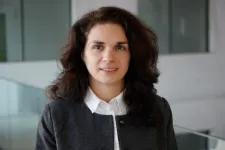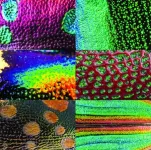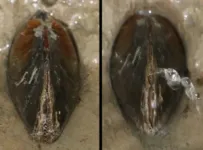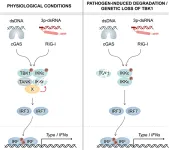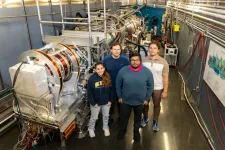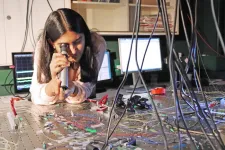New analytical methods and approaches to research are enhancing sustainability and materials research with particular reference to engineering science/technology at the University of Freiburg: Dr. Oana Cojocaru-Mirédin is taking on the new Eva Mayr-Stihl Chair for Multi-Scale Characterization of Materials Systems which has been established at the University’s Department of Sustainable Systems Engineering (INATECH).
Cojocaru-Mirédin, who previously researched and taught at RWTH Aachen, specializes in the application of various characterization techniques in the study of materials on the micrometer to nanometer scale. Atom probe tomography (APT), which is used in many fields such as physics, engineering, chemistry, biology, crystallography and materials sciences, plays a crucial part in her research. Her primary research focus covers advanced materials for the transformation of the energy industry, such as for solar cells and batteries. Funding of one million euros over ten years from the Eva Mayr Stihl Foundation made it possible to establish the Chair. The Hector Foundation II is supporting additional amenities for the Chair with a total of 510,000 euros within the framework of the Hector MINT personnel fund.
Thin film solar cells
The successful realization of photovoltaics with regard to production and efficiency demands new creative approaches in the field of manufacturing, processing and characterization of solar cells. Cojocaru-Mirédin’s preliminary investigations, in particular into the role of microstructure defects in solar cells and their influence on efficiency, show that new findings and the resultant innovative opportunities yield precise technical manipulation and improvement of these systems at an atomistic level. The application of APT offers Cojocaru-Mirédin the possibility of understanding the correlation between composition and the properties of the structural defects being studied. The scientist wants to analyze the extent to which material properties have a critical influence on the efficiency of a solar cell at the University of Freiburg. In addition she wants to draw on this to prepare a sustainability-oriented material design for thin film solar cell technology.
Alkali-based batteries
An essential requirement for the transition to emobility is powerful batteries, however until now their limited capacity has meant that it has rarely been possible to achieve a range of more than 400 km. Over the next decade researchers will therefore be focusing on increasing batteries’ storage capacity, in order to make car-driving more environmentally-friendly. Cojocaru-Mirédin will be investigating how the composition and electrical properties of the energy materials change during use in battery technology. She is also working on an analysis of the mechanisms that are responsible for battery degradation.
Strengthening atom probe tomography in Baden-Württemberg
Cojocaru-Mirédin’s appointment means that correlative microscopy, i.e. APT in combination with a focused ion beam system/scanning electron microscope, can be installed at the University of Freiburg for the first time. In recent years APT has become established as a leading method for atomic analysis of raw materials. Yet until now there have only been two sites in Baden-Württemberg where it was possible to conduct APT. The plan for the University of Freiburg and the two other sites to cooperate will strengthen APT in Baden-Württemberg as a whole. The main field of application for correlative microscopy will be basic research into sustainable materials concepts both in the field of energy systems and in mobility. Multi-scale correlative microscopy will make a major contribution to the understanding of physical phenomena down to the atomic level and is crucial to the ongoing improvement of materials and energy efficiency.
Multi-Scale Characterization of Materials Systems at INATECH
At INATECH, University of Freiburg, there is also a research group – independent of the Eva Mayr-Stihl chair – studying the multi-scale characterization of robust functional materials systems, which is funded by the Carl Zeiss Foundation. Led by Prof. Dr. Stefan Hiermaier, scientists are studying the effects of defects at a microscopic length scale on the macroscopically-observable behavior of a structure, e.g. defects on the scale of the grain size of metals. This focuses on laser melting of metamaterials produced using the 3D printing process.
The Eva Mayr-Stihl Foundation
The Eva Mayr-Stihl Foundation was established in 1986 by Eva Mayr-Stihl and her husband Robert Mayr. One of the focuses of the work of the foundation is to fund science and research. Since the 1990s it has promoted the development of what has become the University of Freiburg’s strategic area of Environment and Sustainability, in particular by endowing chairs and named professorships, as well as providing funding for awards and research, initially at the Faculty of Environment and Natural Resources, later also at the Department of Sustainable Systems Engineering (INATECH) of the Faculty of Engineering. In addition, the foundation supports the Young Academy for Sustainability Research, which brings together outstanding junior researchers for cross-disciplinary cooperation. The University of Freiburg named Eva Mayr-Stihl and Robert Mayr honorary senators for their exceptional contribution to the positive development of the University.
www.eva-mayr-stihl-stiftung.de
The Hector foundations
The H. W. & J. Hector Foundation was founded in 1995 in Weinheim an der Bergstraße by husband and wife Josephine and Dr. h.c. Hans-Werner Hector. In 2008 it was joined by the Hector Foundation II.
The foundations fund the following key areas:
Science and education: Funding of talented and highly-gifted young people (Hector Children’s Academies, Hector seminars, Hector Research Institute of Education Sciences and Psychology), especially in the field of science; funding outstanding researchers with the Hector science prize (www.hector-fellow-academy.de); endowment of personnel funds for universities in Baden-Württemberg, e.g. Hector MINT personnel fund. Funding of 100 million euros for the AI Breakthrough Hub project in Tübingen’s ‘Cyber Valley’, one of the largest research cooperations for artificial intelligence in Europe.
Medical research: Hector Institute for Translational Brain Research together with DKFZ Heidelberg and ZI Mannheim; DKFZ-Hector Cancer Institute at the University Medical Centre Mannheim; Hector-Center for Nutrition, Exercise and Sports at University Hospital Erlangen, calling for research project proposals in the field of research into cancer and Aids.
Social projects: Funding of projects for people with disabilities.
Art and culture: Includes a significant contribution to the construction of the new Kunsthalle Mannheim.
www.hector-stiftung.de
Contact:
Annette Kollefrath-Persch
University and Science Communication
University of Freiburg
Tel.: +49 761 203 8909
e-mail: annette.persch@zv.uni-freiburg.de
Katharina Edlinger
Eva Mayr-Stihl Foundation
Tel.: 07151/96633-14
E-Mail: presse@stihl-stiftung.de
END
